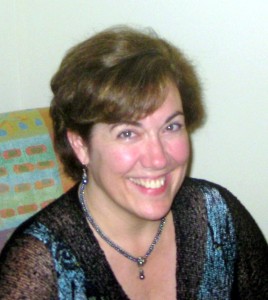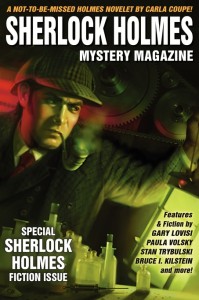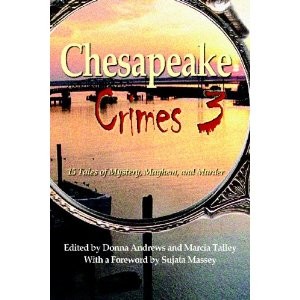 There are some writers who excel in the short story form, such as Ed Hoch did, opposed to full length novels. Another is Carla Coupe whose short story pastiches of Sherlock Holmes have garnered critical and reader praise. Not that she couldn’t and won’t lengthen her work in the future–as she explains in this author interview. Carla gives us her take on Holmes and his fans, why she enjoys the short story form, and delves into her contributions to a Chesapeake Bay locale mystery anthology.
There are some writers who excel in the short story form, such as Ed Hoch did, opposed to full length novels. Another is Carla Coupe whose short story pastiches of Sherlock Holmes have garnered critical and reader praise. Not that she couldn’t and won’t lengthen her work in the future–as she explains in this author interview. Carla gives us her take on Holmes and his fans, why she enjoys the short story form, and delves into her contributions to a Chesapeake Bay locale mystery anthology.
Q 1. Carla, what is it about the short story form that draws you to it?
As much as I enjoy gigantic, sprawling novels, in short stories I love the narrative focus, the need to cut away all extraneous matter. Every word counts, and the best stories display a surgical precision in the use of language. They give me something to strive for.
Q 2. Do you have any interest in writing a full length novel–be it a long form Sherlockian pastiche or some other subject?
Like most writers, I have an unpublished novel or two in my desk drawer, and I’d like to revisit at least one of them someday soon. Now that I have more experience as a writer, perhaps I can fix their faults and garner some interest from a publisher. And yes, I have a few ideas for another novel, so you may see something longer than a short story from me yet.
Q 3. As a Sherlockian, as fans are sometimes known, tell us who have little or no interest in the great detective what we are missing.
Ack! I’m a lousy evangelist! I know the Holmes stories don’t appeal to everyone, and that’s fine. The world would be boring if we all liked the same things. That said, I think part of the appeal of these stories is that they  provide a wonderful glimpse into the late Victorian world, a period of excess and Empire. It’s a time many people find fascinating. Holmes himself is an intriguing character, so modern in many ways, and in others very much a man of his time. He’s the type of character you’d love to spend a day with, just to observe him. Sir Arthur Conan Doyle himself was a talented writer, and his straightforward style highlights the unexpected twists and turns of the plot, as well as displaying Holmes’ brilliance and Watson’s awe.
provide a wonderful glimpse into the late Victorian world, a period of excess and Empire. It’s a time many people find fascinating. Holmes himself is an intriguing character, so modern in many ways, and in others very much a man of his time. He’s the type of character you’d love to spend a day with, just to observe him. Sir Arthur Conan Doyle himself was a talented writer, and his straightforward style highlights the unexpected twists and turns of the plot, as well as displaying Holmes’ brilliance and Watson’s awe.
Q 4. As a manager of a mystery bookstore, I used to cater to Sherlockians, especially on Sherlock Holmes’ birthday in January. Hoards of fans would descend and buy any thing and every thing that had been written recently with Holmes involved. Do you believe that fans of Holmes are more dedicated than fans of other detectives, such as Nero Wolfe? And if so, why do you think that is?
Oh, I know rabid fans of many different topics, so no, I don’t think fans of the Canon are set apart by their devotion. One thing they do have is longevity, though. Because most of the stories are over 100 years old, there’s been plenty of time for fans to create societies, to write thoughtful articles and pastiches, and to establish a bit of a reputation for fannish excesses. Let’s see how the fans of the Tolkien stories are viewed in another 40 or 50 years before considering Holmes fans unique.
Q 5. What do your Sherlockian pastiches focus on? Laurie R. King has Holmes married and solving crimes with his wife. Is your Holmes still a single man?
Yes, he’s a confirmed bachelor in my pastiches—even the one where he fools Watson into thinking he’s married a suspect! (Watson is mightily relieved to know that Mycroft played the part of the reverend who performed the “ceremony.”) I love the plots of the Canon stories, watching Holmes solve (and occasionally fail to solve) the mystery. That’s the sort of story I enjoy writing. Three of my pastiches owe their genesis to the Sherlock Holmes radio plays of the 1940s—they’re great fun to listen to, even today.
Q 6. You’ve been nominated for your excellent Holmes stories by Malice Domestic whose convention meets in the beginning of May. What is that experience like, and do you gain a considerable amount of new fans because of the nomination, or have you seen no difference?
Actually, I was nominated for two Agatha’s for stories with original characters. One of my Holmes pastiches, “The Book of Tobit,” was included as a distinguished short story of 2011 in The Best American Mystery Stories of 2012. I’m sure nominations, in addition to providing strokes for a writer’s ego, also increase the number of folks reading her stories, but I have no quantitative data to support that assertion.
Q 7. When in London, I passed by Holmes’ residence on Baker Street. Have you visited the spot? Has he become a real live individual to you, as he has for many–there are people who believe he really lived there?
No, I haven’t visited the museum on Baker Street, although I’d like to. Is he real to me? Absolutely. He and Watson, Mrs. Hudson and Irene Adler and Lestrade and Mycroft, all are real people to me. (But I don’t kid myself—I know I will only encounter them in my imagination.)
Q 8. You also contribute to a short story anthology with authors from the Chesapeake Bay of Maryland. What is it about that area that is special enough for so many renown writers to add their voice?
Geographic areas of transition such as coasts, mountains, and canyons are interesting in and of themselves, and I think they spur creative thought. The Chesapeake Bay is a huge area with many types of environments, from beaches to marshes, from the open water to dry land, so there’s a lot of choice in setting. It also has a rich history, which is excellent fodder for any writer.
 Q 9. How is writing for an anthology for a specific geographical area different than writing your Sherlockian pastiches?
Q 9. How is writing for an anthology for a specific geographical area different than writing your Sherlockian pastiches?
When you write a Canon-based pastiche, you’re working within fairly tight constraints of character, setting, and style. That doesn’t mean you can’t be incredibly creative within those constraints, however! But you are more limited in your choices. Writing a story set in a certain geographic area allows you a great deal of latitude regarding characters and situations and even settings. You could write a story set on a beach or a boat or a bridge, and still be writing about the bay area.
Q 10. Is there another fictional or historical figure you would love to ink your pen and write about?
I’d love to write a story (short or novel-length) with Christopher Marlowe as the protagonist. There’s so much we don’t know about his life or his death, and that period was, like the late Victorian, a hothouse for creativity. And I’d have a tremendous amount of fun just doing the research!
